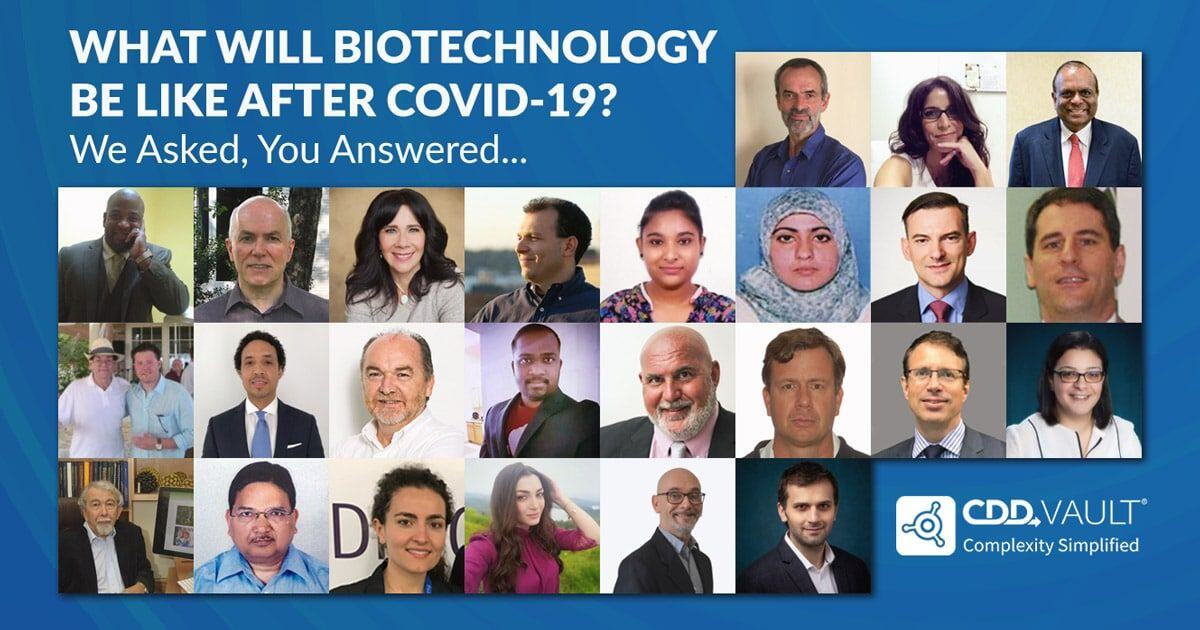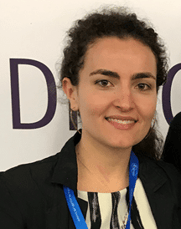
Authored by Jason Bret Harris, PhD
Join the discussion with your comments on the LinkedIn Post.

![]() Marcel Velterop, M.Sc. - President, Drug Discovery Services & CDMO, Jubilant Biosys
Marcel Velterop, M.Sc. - President, Drug Discovery Services & CDMO, Jubilant Biosys
The pandemic has been a global event, but our global readiness has been surprisingly poor in dealing with what was not a surprising or unexpected event. Improved coordination between governments and researchers will be required. The astronomical human and economic impact should serve as a painful reminder to get this right from now on.
We also got a rare glimpse into the mirror of our current societal model and its devastating impact on the planet we all live on. Cleaner air in major cities around the world, fewer accidents and incidents and nature getting a much needed reprieve from mankind. COVID achieved what the Paris Agreement could not; a drastic reduction in carbon emissions.
![]()
![]() Professor Sir Tom Blundell, Ph.D. - Fellow of the Royal Society, FMedSci, Department of Biochemistry, University of Cambridge
Professor Sir Tom Blundell, Ph.D. - Fellow of the Royal Society, FMedSci, Department of Biochemistry, University of Cambridge
We realise the advantages of having very free access to data by developing collaborations internationally. We also emphasise the very great importance of bringing together biochemists and biophysicists, with cell biologists and clinicians, as well as chemists. The divisions that have been established for teaching in most universities must be abandoned and cross university collaborations essential from the start involving basic academic science and clinical research with colleagues on the front line.
We have learnt that we need to be very flexible and refocus very quickly for SARS-CoV-2. We have used our software developed in the lab to understand the structures and interactions of the proteins within the viral capsid and between the virus and human host receptors using our methods for predicting protein structure interactions with other proteins and with ligands developed over four decades. We learn that repurposing approved drugs is very important! We also learn that we need to have very quick access to our DNA constructs to enable expression of the various components. We can then use methods developed for cancer in my company Astex (two cancer drugs on market) over two decades to begin a drug discovery campaign using fragment based methods. We learn that our approach has the advantage of exploring chemical space much more efficiently and can be applied to new targets in new diseases.
![]()
![]() Mia Nease, D.B.A. - Founder & CEO, Multiomic Advisory Services
Mia Nease, D.B.A. - Founder & CEO, Multiomic Advisory Services
COVID-19 may be the tipping point that shifts us from the current model of "sick-care" to a more proactive, preventative, participatory, and personalized "health-care" model. Sadly, the virus has highlighted how the presence of lifestyle diseases like obesity, hypertension, and type 2 diabetes can increase a person's risk of succumbing to infectious disease. While we cannot change a person's chronological age, we may see more payer investment and provider effort to reduce a person's biological age via proactive therapeutics and emphasis on a healthy lifestyle.
![]()
![]() Marco Biamonte, Ph.D. - Founder & CEO, Drug Discovery for Tropical Diseases
Marco Biamonte, Ph.D. - Founder & CEO, Drug Discovery for Tropical Diseases
For all our technology, we remain vulnerable, as pathogens mutate and evolve so much faster than us. Primary health care centers around the world must be strengthened and there must be super-efficient international disease surveillance systems. We are interconnected: the mindset that things don't matter just because they happen elsewhere is deeply flawed. Conversely, when people work together, great strides can be made quickly, as evidenced by the fact diagnostics that combine innovations and reagents from multiple countries are reaching the market in record times.
It is my hope that the need for surveillance of infectious diseases will be better recognized. COVID-19 has killed 190,000 people to-date. Malaria kills every year over 200,000 people, mostly children, but people rarely hear about it. And there are neglected tropical diseases which may not be lethal but which are debilitating and that affect tens of millions. I hope those will be addressed too.

![]() Elena De Vita, Ph.D. - Research Associate, Medicinal Chemistry, Imperial College London
Elena De Vita, Ph.D. - Research Associate, Medicinal Chemistry, Imperial College London
l hope that from this pandemic we will learn to get prepared to answer more "what ifs" in the future. The drug discovery pipeline may have learnt this the hard way, by being short-sighted against the SARS outburst of 2004. COVID-19 has caught us yet again unprepared this time, but it certainly improved our team-working skills for the common good. Once again, we have learnt that we are not invincible, and we must be aware that these events are not unlikely to repeat themselves. Yet having reached and reignited the public awareness is key to leave us prepared for similar scenarios. We should thus consolidate the scientific channel that has engaged the public on this occasion. Doing this will be pivotal to help us defeat the common enemy and to come out as an ever-stronger community.
Despite looking forward to going back to how things were, we are well aware that our lives will not be the same for a long time, if ever. The whole community will see the scientific efforts with renewed understanding and expectations. Eventually, each individual must reinstall trust and comfort in his own mind. Personally, I look forward to rejoining the scientific community "hands-on" and I will treasure the possibility to collaborate again with colleagues all around the world. I feel that matching our actions to our feelings will be key to boosting our regeneration process.
![]()
![]() Jurgen Bosch, Ph.D. - Research Scientist, Case Western Reserve University; CEO & Co-founder, InterRayBio, LLC
Jurgen Bosch, Ph.D. - Research Scientist, Case Western Reserve University; CEO & Co-founder, InterRayBio, LLC
We learned that if we want to work together across disciplines and borders, we can. The scientific community has come together on this from all angles, not only academic but also pharmaceutical companies, and even collaborating together by sharing in an unprecedented way our research data. The Open Science Movement should hopefully benefit from this experience. Combining resources and fighting together has already achieved multiple milestones that otherwise would have taken years to accomplish e.g. development of serological testing.
Even in biotech, we may travel less for work purposes as Zoom is as effective to collaborate across the globe. The digital divide between those who can afford and those who can't is more obvious now and needs to be addressed. Equal access should become a priority. Development of free fast access to internet resources should be prioritized as well. Lastly, we will be better prepared for the next pandemic. It's not a question of if but when will it occur.
![]()
![]() Daniel Wansley, Ph.D. - Research Investigator, Health Research Institute of the Balearic Islands
Daniel Wansley, Ph.D. - Research Investigator, Health Research Institute of the Balearic Islands
I expect that we (the scientific community) will learn about mechanisms of SARS virus entry into host cells, as well as other aspects related to the excessive transmission that has occurred with COVID-19 and has led to the pandemic. Upon investigation of the humoral and cell-mediated immune responses to COVID-19 we will understand the structures and genetic codes that the T and B cell-receptors have employed in the antiviral response. From the perspective of basic immunology and epidemiology we have many new insights to gain.
When this pandemic is over the human psyche will undoubtedly be different with respect to "freedom". I expect that the world-wide reach of this pandemic will lead humanity to take bold stances in many aspects of life and governance. Most importantly and inevitably the world will have a newfound appreciation for science and the importance for embracing the one and only commonality that exists without boundary, our humanity and will to survive. Biologically, I expect that our most brilliant minds and technologies will come together better to implement strategies that avoid viral epidemics in the future.
![]()
![]() Mark A Reed, Ph.D. - Staff Scientist II, Krembil; Assistant Professor, Department of Pharmacology & Toxicology, University of Toronto
Mark A Reed, Ph.D. - Staff Scientist II, Krembil; Assistant Professor, Department of Pharmacology & Toxicology, University of Toronto
The science community reacted swiftly to SARS-CoV-2, repurposing approved drugs and novel therapeutics towards the underlying pathogenic processes and pathways. COVID-19 has taught us that interdisciplinary collaboration, networks and communication are essential to quickly understand the disease and bring treatments to market.
Rapidly deploying expertise and therapeutic understanding in disease pathways such as oncology and immunology and channeling to infectious diseases will be critical. In the future, having a pre-established, "therapeutic task force" or network that can be quickly activated and sufficiently funded will be crucial to react to the next pandemic.
![]()
![]() Domingo Gargallo-Viola, Ph.D. - CSO, ABAC Therapeutics
Domingo Gargallo-Viola, Ph.D. - CSO, ABAC Therapeutics
The COVID-19 pandemic is an acute and severe representation of the threat and the consequences of infectious diseases, which has put on the stage the weaknesses and the lack of knowledge of society and its leaders to manage infections. However, the COVID-19 pandemic is only the tip of the iceberg for challenges that the human species has faced and will face, with respect to infections. Tuberculosis, malaria, gastrointestinal and respiratory infections have killed and continue to kill millions of people every year in poor countries. Attention to COVID-19 may bring more attention to other infections that plague humanity.
But it is a serious mistake to link fighting infectious diseases exclusively with developing countries, multi-drug resistant bacteria cause 700,000 deaths worldwide each year. 32,000 deaths a year officially registered in Europe and 30,000 deaths a year in the USA, and by 2050 if we don't act urgently, infections could claim 10 million lives annually and a $100 trillion cost in terms of global gross domestic product.
We have to take more seriously the threat that infectious diseases pose to our lives and we have to invest more resources to push the discovery and development of new agents to fight infections in general, not only those that affect rich or poor countries. The earth is efficiently interconnected, more than 200,000 flights have been operated in one day. The fight against infectious diseases is an urgent global health challenge, which must be addressed collaboratively through public-private partnerships.
If we look broadly, at the current COVID-19 but other infections, the threat of infectious diseases and the impact on our future is far from being an apocalyptic fantasy but instead is a very real possibility for the 21st century.
The health and economic crisis generated by COVID-19 has highlighted many of our weaknesses, and now we all share the need to enhance cooperation between countries, emphasizing the fact that the challenge of infectious diseases can only be resolved through collaboration and transnational research.
Another worrying issue that we have to critically analyze in detail is the high percentage of health professionals affected by COVID-19. It has to change and improve the training of doctors, nurses, ... in the management of patients with infectious diseases and in knowledge of microbiology and epidemiology. Many heart diseases are taken care of by family doctors, internists,…. , but it is evident that patients with complex heart problems are cared for by cardiologists, because the experience and knowledge of specialists has been shown to improve the prognosis of the disease. Knowledge about the proper use of personal protective equipment, and the management of potentially infected patients, cannot be improvised. The health challenges of the magnitude of the COVID-19 are not solved only with attitude and effort, it takes experience and knowledge.
But in addition to the training, it is necessary for professionals to have the equipment and health infrastructure to tackle their work with guarantees. Moreover, the hospital should have special areas enabled to treat contagious patients. For example, rooms with negative air pressure, isolators to isolate patients with serious contagious infections by air, changing rooms and showers so that staff can change and return home without risk of infecting their family.
I hope that society becomes aware of the threat linked to infections, that the authorities dedicate the appropriate measures to train professionals and invest in hospitals to build infrastructures to treat infected patients.
This is a clear example of needing to think and coordinate globally (cooperation between countries) but act locally (in each hospital, in each doctor, and in each person).
![]()
![]() Pavel Pogodin, Ph.D. - Laboratory of Structure-Function Based Drug Design, Institute of Biomedical
Pavel Pogodin, Ph.D. - Laboratory of Structure-Function Based Drug Design, Institute of Biomedical ![]() Chemistry, Moscow, Russia
Chemistry, Moscow, Russia
Executing quarantine measures fast and effectively will depend on the fast development and validation of diagnostic kits. I also expect that there will be new protocols made to fast track vaccine development. There also may be more effort to identify drugs having broad spectrum antiviral activity. Such drugs could be of great help in situations like the current one.
All human viruses have one thing in common, the host. We have an opportunity to learn more about host-SARS-CoV-2 interaction as a result of this pandemic and relate what is learned to handling other viral pathogens. (My personal position and the official position of IBMC may be different).
![]()
![]() Nathalie Moussa - Ph.D. Candidate, Medicinal Chemistry and Quality Control Department, Damascus University
Nathalie Moussa - Ph.D. Candidate, Medicinal Chemistry and Quality Control Department, Damascus University
As a researcher in the Middle East, I can say it's time to take a part in global academic research because we have all learned from COVID-19 how connected and small the world is in times of crisis. We all need each other and need every single effort to fight, survive and learn. We can achieve more when we make resources, instruments, materials, information and software available to all so that researchers can work as a team when lives are on the line.
![]()
![]() Ed Addison - CEO, Cloud Pharmaceuticals
Ed Addison - CEO, Cloud Pharmaceuticals
In the therapeutics and vaccines area of biotechnology, I see three significant impacts:
1. Drug Repurposing - Rapid repurposing of existing drugs and collection of anecdotal clinical data proved useful. We have learned that combinations of existing drugs can be a rapid therapy that provides some immediate value, but we must be careful to learn about drug interactions. Going forward, we will be much more methodical on how to repurpose drug combinations, maintain & share data, and how to conduct clinical studies simultaneous with giving clinical care
2. Speeding up R&D with AI and Data - There have been numerous drugs being developed by biotechnology companies that have had accelerated drug discovery and quick movement into or toward the clinic. COVID-19 has opened our eyes that if we think "out of the box" we can be much faster than our ways of the past. This particularly includes the assistance of AI at various stages of drug discovery being fully integrated with traditional discovery. The available funding in biotechnology is scant for discovery and much more plentiful for clinical studies, despite its higher cost, due to value and risk. As an industry, we shall learn to progress much faster from initial discovery to the clinic, as we can use the successes here as case studies and examples of best practices. So many discovery programs get shelved due to limited funding, that if we can learn to shorten the path and reduce the cost by an order of magnitude or more, there will be many more clinical stage drugs funded.
3. Vaccines by "Crowdsourcing" - The rush to find a vaccine has resulted in dozens rushing to the clinic. With the government now funding manufacturing BEFORE the Phase 3 trial, we are seeing an example of time savings by the first real implementation of the "continuous clinical trial" overlaid upon a variation of "crowdsourcing". These vaccines are competing with each other to be the winner. There is nothing like competition to incentivize creativity. We shall see a movement toward the continuous clinical trial and simultaneous competitive development with government incentive for pressing healthcare needs.
![]()
![]() Terry Stouch - President, Science For Solutions, LLC
Terry Stouch - President, Science For Solutions, LLC
There are issues with data in terms of quality and availability ... and more. Researchers need to address collection, storage, and sharing of information so that it is accessible, comparable, and accurate. It appears that there are many different effects for people (not just age) which presents a challenge but also a lesson that we can apply for better treating other diseases.
![]()
![]() Adrian Caciula, Ph.D. - Sr. Programmer Analyst, Center for Infection and Immunity, Mailman School of Public Health, Columbia University
Adrian Caciula, Ph.D. - Sr. Programmer Analyst, Center for Infection and Immunity, Mailman School of Public Health, Columbia University
We learnt that rapid and accurate detection of pathogens in human samples is critical during such pandemic. Serological assays played an important key in testing, yet targeted viral sequencing methods were not [easily] available.
High throughput sequencing methods provide valuable information for full genome characterization of viruses. We hope the cost and analysis time will decrease and labs will have the ability to sequence and analyze the nucleic acid at a push of a button.
While skies became much cleaner, and the Earth enjoyed her way, We have found the drug which treats the virus. We have found a world which smiles to us. We preferred the Earth we found, to the world we left behind. Cities closed their streets to cars, while opening for people, and simple acts of kindness are now gathering their due.
![]()
![]() Rupesh Agarwal - Ph.D. Student - Center for Molecular Biophysics, Oak Ridge National Lab; Graduate School of Genome Science & Technology, University of Tennessee, Knoxville
Rupesh Agarwal - Ph.D. Student - Center for Molecular Biophysics, Oak Ridge National Lab; Graduate School of Genome Science & Technology, University of Tennessee, Knoxville
In my opinion, one thing we will learn is the importance of scientific research. Funding in science has been on a decline, and there is an urgent need for lawmakers and non-researchers to realize that funding research is necessary for survival. On a positive side, this pandemic has brought together researchers from all around the world and from different disciplines like never before. Drug companies and academic researchers are collaborating in an unmatched way to fight this unprecedented situation. At UT-ORNL Center for Molecular Biophysics, we are pushing our limits and using the SUMMIT supercomputer for performing high throughput virtual screening like never before. We are currently screening a database of existing FDA approved drugs and soon are going to screen giant databases. I hope we take the best out of this situation and continue large-scale efforts and collaborations in the future.
I expect that the COVID-19 pandemic will start many new collaborations and funding opportunities. In the CMB group at ORNL, we have identified many drug targets and potential drug molecules, but often the projects die after a while due to lack of proper funding to go all the way into clinical trials. Therefore, an increase in the funding will motivate researchers to engage in drug discovery activities and be better prepared to fight future pandemics and other lethal diseases.
On a lighter note, the life of a graduate student (computational biophysicist) like me would not be the same mainly because my advisor now knows the amount of work I can get done from home.
![]()
![]() Jonathan C Krause -President & CEO, Synclarity Consulting
Jonathan C Krause -President & CEO, Synclarity Consulting
Of the many things we will learn from this current crisis, one of the biggest is, "how will we rebuild?" Healthcare systems will have to optimize workflows and supply chain solutions, and accountable care organizations will need to look at cost containment measures to support the treatment decisions of all chronic conditions. We will see accelerations and increases in drug discovery and drug development activities.
To continue to compete in a global marketplace, the United States needs to more strongly embrace the concepts of diversity, equity, and inclusion, now more than ever. To not only build more cultural competence but develop a greater understanding of multiculturalism; and its ability to create new ideas and drive innovation. The way we socially interact will be fundamentally changed forever; so to effectively perform, individuals, teams, and organizations will need to learn how to communicate and collaborate in a more decentralized manner. There will need to be more diverse intersections of thought driving collaboration and innovation; which means the education and health-care systems; combined with industry will have to establish new training protocols, market access, diversified commercial channels, and sales processes, via telehealth, distance e-learning, and remote conferencing. The future of the work will be virtual and remote, which will require new and different leadership skills, to engage and drive performance.
![]()
![]() Mark Parisi - Executive Director, Asinex
Mark Parisi - Executive Director, Asinex
In the future, we will be better prepared for any such outbreaks as one takeaway from the situation with COVID-19 is that we were very badly prepared.
Research will be focused on finding a cure to a point where we have both therapeutics and a vaccine (or vaccines) to combat the disease. In this regard, we will need to consider using antiviral compound libraries better in the future.
Mukund Chorghade - President & CSO, THINQ Pharma / MVRC
As the old Scouts motto goes: "Be prepared!" It is very important to plan for contingencies, particularly where research will be affected. We will devote a lot more resources towards research labs and the hiring of scientists. Many things were outsourced to lower costs. which will likely be reversed.
People are associating science, scientists, and health professionals as doing good for the country. The pandemic will reverse the negative perceptions of Science among many people. We learned that a disproportionate amount of resources were spent on management consultants, and the trend towards management assisted downsizing will change.
![]()
![]() Uday Chintapula - Ph.D. Candidate, Nanomedicine and Drug delivery Laboratory, The University of Texas at Arlington
Uday Chintapula - Ph.D. Candidate, Nanomedicine and Drug delivery Laboratory, The University of Texas at Arlington
ELISA, laminar flow, and other diagnostic kits will be developed as plug and play systems to facilitate new antibodies or peptides ready to be deployed for detection of novel pathogens without developing kits from scratch.
The whole drug discovery-to-market path will be changed, filled with new rules and regulations based on the infectious rate of disease. Repurposing of approved drugs will play a major role in drug discovery for new diseases because of their already assessed safety profiles which can shorten the drug to market timeline. Bioinformatics will be crucial in providing insights of potential drug candidates during pandemics. Bioinformaticians and single-cell omics data will be at the forefront of treatment strategies and drug discovery by providing researchers with potential personalized treatment regimes for various drugs, different age groups, and physiological conditions.
![]()
![]() Sally Esmail, Ph.D. - Postdoc Fellow, Western University
Sally Esmail, Ph.D. - Postdoc Fellow, Western University
It is clear that we will need a better system to deal with similar pandemics in the future. Pandemic preparedness should be a central feature in our future research. Creating a systematic approach to deal with COVID-19 will help us in future pandemic/epidemic preparedness. We should also start creating biotechnology platforms to help screen for antivirals and vaccines. It also might be prudent that each country is self sufficient in responding.
After the COVID-19 pandemic ends, I am expecting more funding towards research in the field of infectious disease. Also, I am expecting to see more money invested in health care systems, infectious disease and vaccine R&D.

![]() Sérgio Vechi, Ph.D. - Associate Professor & Computational Chemist, Federal University of Alagoas
Sérgio Vechi, Ph.D. - Associate Professor & Computational Chemist, Federal University of Alagoas
This pandemic has highlighted how the planet and our health are intertwined! I hope that we will learn to collaborate more efficiently on a global level since these threats are not limited to borders. Regarding artificial intelligence, we are at a point of no return and its role is strategic to accelerate new discoveries that may impact such a desired cure.
We will have to learn to live better with ourselves, develop more empathy for others, and with the forced home office, learn to integrate better our professional and personal lives. We will also have to prepare ourselves better for professional online communication and training.
![]()
![]() Steven J. Projan, Ph.D. - Principal, Beat the Reaper LLC
Steven J. Projan, Ph.D. - Principal, Beat the Reaper LLC
Great science and scientists will need leadership. We must work to support a pandemic preparedness team as part of the National Security Council.
![]()
![]() Miss Aakriti Garg, MPharm - Teaching Assistant, School of Pharmaceutical Sciences, Apeejay Stya University, Gurgaon, India
Miss Aakriti Garg, MPharm - Teaching Assistant, School of Pharmaceutical Sciences, Apeejay Stya University, Gurgaon, India
We should focus more on the growth of pharma industries to fight against future diseases. We will need to be quicker in decision making, such as working from home, by having procedures and plans in place.
 Dr. Anil Kumar - Professor and Head (Retired), School of Biotechnology, Devi Ahilya University
Dr. Anil Kumar - Professor and Head (Retired), School of Biotechnology, Devi Ahilya University
An important lesson everyone will imbibe from this pandemic is the magnitude of working in collaboration. We all have learned that we can't be fully independent; our health is dependent on others, especially in cases of contagious diseases. Everyone must be considerate to think about the welfare of others. Governments need to work hand in glove with the citizens and researchers to reduce the pandemic consequences. COVID-19 pandemic has brought in light the relevance of research in Science and Technology. In the current scenario, for successful drugs/vaccines, researchers must work in collaboration without any physical/terrestrial boundaries.

![]() James T. Palmer, Ph.D. - Pharmaceutical Discovery Consultation
James T. Palmer, Ph.D. - Pharmaceutical Discovery Consultation
On a more technical level, we will learn that rapid diagnostics (i.e. testing) must not carry excessive burdens of qualification (which in the case of COVID-19 meant that only those who met a stringent level of symptoms and travel or contact history could initially even qualify for a test). Turnaround time for diagnostics must improve, since delays in result communication fueled the spread. An improvement in diagnostic efficiency will also mean those who test positive can be treated earlier. We will also learn that clinical trials will often yield disappointing results, but we must look at the methodology of those trials very carefully to determine whether the chance of success was decreased, for instance, by poor sampling, poor patient recruitment strategies, tardy intervention/dosing (e.g. giving a drug to patients where the problem was not necessarily the drug target, but the host response to the pathogen), and inappropriate scientific basis for the study. We will also learn (finally) that focus on combination therapies against infectious pathogens and other acute diseases stand a greater chance of success than monotherapies, but it will take time for this to sink in as arrangement of clinical trials will be the rate-limiting step.
I'd like to believe that drug discovery for unmet medical needs will not be diluted too badly because of excess focus on "the disease of the month" syndrome. If 10% of the global population gets COVID-19, that means 90% of the population doesn't, but all the other illnesses will remain as and until they are addressed. Supply chain management will also need to improve.
We will learn that if, and only if, we unite in the way we tackle a foe without political borders, will we succeed. This will be the big difference.

Andrea Guatelli - Legal Counsel | Biotech & IP Specialist | International & Governmental Law
Certainly the main finding is that our level of preparedness for this pandemic was very poor, as well as our knowledge is still limited but is growing rapidly and will continue to do so in the next several months, perhaps a year or more. This relates to diagnoses, understanding the different strains, testing, monitoring, personal health behavior to mitigate risk and the development of a vaccine or vaccines. A coordinated approach from the leading academics and practitioners is the best way to solve the future problems. However there is currently a false sense of global management and a great increase in geo-political issues.
A massive investment in the health system is critical to boost the effectiveness and the efficiency of immunological protocols and overall healthcare systems. Therefore, a further momentum in AI, Genomics, and Diagnostics will be the key answer. New CRISPR-based tools have proven their effectiveness to treat and cure a number of viral and bacterial pathology, with multiple clinical trials being carried out or already completed. Plus, molecular techniques in immunization (ex. viral messenger RNA) is a growing need due to the technical impracticability of traditional immunological treatment.
There is a line of argument which is "the biotech industry has an opportunity to step up to a greater awareness of the importance of personal health at an individual, national and international level..... it will require new business and operational models that move towards prevention rather than cure and long term value to the community rather than short term profits"

![]() Arem Qayum, Ph.D. - CSIR-IIIM, India
Arem Qayum, Ph.D. - CSIR-IIIM, India
We need to utilize internet technology and telemedicine to expand well-being worldwide. COVID-19 could be what makes us at long last deliver on the guarantees of remote learning and medicine.
"Heal the world, make it a better place for you and for me, and the entire human race." - Michael Jackson
This blog is authored by members of the CDD Vault community. CDD Vault is a hosted drug discovery informatics platform that securely manages both private and external biological and chemical data. It provides core functionality including chemical registration, structure activity relationship, chemical inventory, and electronic lab notebook capabilities.

Other posts you might be interested in
View All Posts
Events
14 min
March 27, 2025
Collaborative Drug Discovery's Inaugural Canadian User Group Meeting
Read More
CDD Blog
5 min
March 21, 2025
Drug Discovery Informatics for Big Pharma: Key Webinar Insights
Read More
CDD Vault Updates
3 min
March 19, 2025
CDD Vault Update (March #2 2025): Macromolecule Atomistic Rendering, AI Datasets, Import Inventory Locations, Larger Inventory Boxes, Dark Mode
Read More



